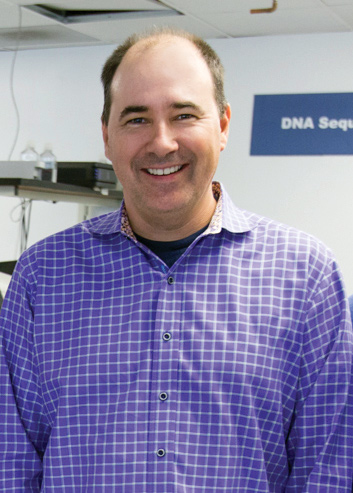Alumni in Research

Matthias Steffen 98C is chief quantum architect at IBM Research, where he helps develop IBM Q quantum computer systems for public and commercial access.
Quantum computers are powerful machines built on the principles of quantum mechanics, a branch of physics that explores how the physical world works at the most fundamental levels. At this level, particles behave in strange ways, taking on more than one state at the same time, and interacting with other particles that are very far away.
Quantum computing harnesses these quantum phenomena to process information in a novel and promising way. By harnessing such natural behavior, quantum computing can run new types of algorithms to process information more holistically, fundamentally speeding up certain operations that are not possible in conventional computing. One potential application includes quantum chemistry with the promise of accurately simulating molecular interactions, which may be important to drug development in the future.
“We are very proud of the IBM Q Experience, which is available for anyone to use. We have five- and sixteen-qubit devices available and tutorials for using them that are being used in classrooms. There also is an IBM Q Awards program now for developing course materials, building tutorials, publishing papers, and specific code modules for these small quantum computers. There have been more than thirty research papers published by scientists who otherwise wouldn’t have access to an experimental device like this to test theories,” Steffen says. “We want to enhance these capabilities over time and build an ecosystem that will allow us to really figure out what it can do. This helps us figure out bugs and get ideas for what works and what appeals to a wider community.”

Michelle Berrey 86Ox 88C 92MPH is developing drugs designed to help patients with weakened immune systems ward off devastating viral infections.
Berrey is president and chief executive officer of Chimerix, a biopharmaceutical company dedicated to discovering, developing, and commercializing medicines that improve outcomes for immunocompromised patients. Berrey joined Chimerix as chief medical officer (CMO) in 2012 and was named CEO in 2014.
Before joining Chimerix, she served as CMO at Pharmasset, a small biotech focused on treatment of hepatitis C, from 2007 until its acquisition by Gilead Sciences in 2012. Previously she spent eight years at GlaxoSmithKline, where she was vice president for viral diseases, clinical pharmacology, and discovery medicine. Throughout her career, she has focused on viral diseases with a significant impact on public health, including HIV, chronic viral hepatitis, and DNA viruses.
“We are focused on solutions that can improve outcomes for patients who are undergoing a potentially life-saving stem cell transplant. As we learn more about the potential risks associated with more aggressive transplants now being pursued, we have a better understanding of the impact of reactivating or reawakening viral infections that may have been dormant since the first exposure to these viruses as small children,” Berrey says. “Reactivation of any one of these viruses can result in an active viral infection, which can quickly become life-threatening. And reactivation of multiple viruses, once believed to be a rare event, is now expected in two-thirds of stem cell transplant recipients.”
Chimerix’s lead product candidate, brincidofovir, has shown the potential to treat or prevent viruses from all five families of double-stranded DNA viruses that aff\ect humans, including the herpesviruses and adenoviruses. Brincidofovir has received Fast Track designation from the FDA for adenovirus, cytomegalovirus (CMV), and smallpox, and Orphan Medicinal Product Designation from the European Commission for adenovirus, CMV, and smallpox. The company also has brought forward a new clinical candidate, CMX521, the first directacting antiviral specifically for the treatment and prevention of norovirus.

With years of expertise and innovation in human genomics, Kevin McKernan 95C founded Medicinal Genomics to build a stronger scientific environment for the study of cannabis-based therapeutics and blockchain technologies for tracking and verifying cannabis genetics.
McKernan pioneered the sequencing of the cannabis genome in 2011 with the intention of building a “map” of all of the genetic factors that might predict the expression of compounds— including cannabinoids, terpenes, and flavonoids— in diff erent strains of cannabis. That allows scientists to cultivate diff erent strains of cannabis with the characteristics best suited to treat specific conditions. The cannabis genome is roughly ten times more diverse than the human genome.
“The wonderful thing about the cannabis plant is the compounds are very safe, it has more chemical diversity than all of Pfizer and Merck, and it’s about to become an over-the-counter, open source, so if we can combine that with personalized medicine, we see this as two huge economic tsunamis colliding,” says McKernan, who earned his bachelor’s degree in biology from Emory with a focus on cloning and expressing norepinephrine transporters.
Through the website Kannapedia.net, Medicinal Genomics publishes genetic information obtained using the company’s cannabis strain identification and registration service. Growers provide samples and Medicinal Genomics provides the identity, heritage, and chemistry of the cannabis and hemp plants to identify the exact strain and key characteristics of the plant.
Genetics also can be used to determine plant gender, detect harmful microbes, and patent strains, as well as informing breeding decisions. Sequencing and registering strains can also protect producers as cannabis production starts generating patents and trademarks.
“This is a marketplace that is emerging out of a black market,” says McKernan. “DNA sequencing techniques can be used to see what products are a right fit for the right patients.”
In October, Medicinal Genomics is holding its CannMed 2018 conference at the University of California–Los Angeles’s Luskin Center to showcase the leading research in cannabinoids, genomics, personalized medicine, and blockchain technology.




